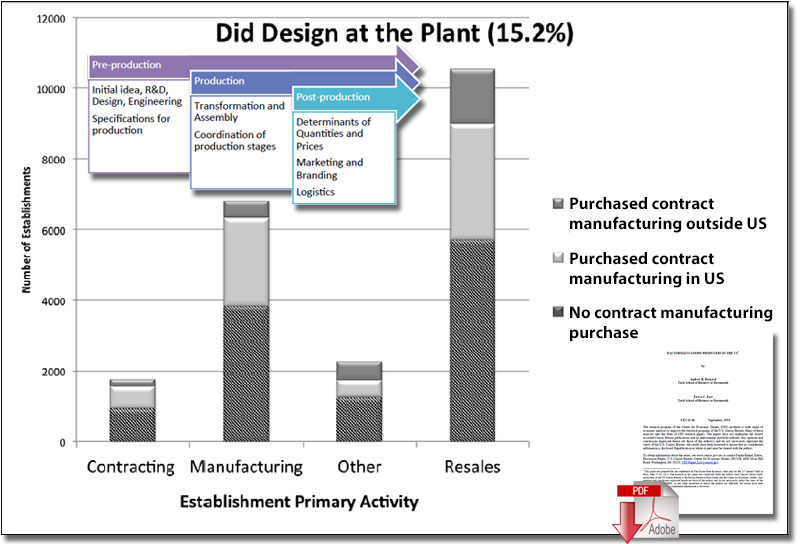Let’s Just Pretend We Didn’t Offshore Manufacturing
Hope for a “renaissance” of U.S. manufacturing will come through new policy making informed by accurate data, not politically convenient distortions.
Is an iPhone made in China and exported to Europe as a U.S. export?
Is an Apple executive a manufacturing worker?
Yes, and yes. At least those could become the answers if a new proposal afoot among some in the administration is allowed to take effect.
Federal agencies grouped under the bland-sounding Economic Classification Policy Committee (ECPC) are proposing to radically redefine U.S. manufacturing and trade statistics.
Under the proposal, U.S. firms that have offshored their production abroad – like Apple – would become “factoryless goods” manufacturers.
The foreign factories that actually manufacture the goods – like the notorious iPhone-producing Foxconn factories in China – would no longer be manufacturers, but “service” providers for the rebranded “manufacturing” firms like Apple.
Related: A Surprising Report on How Much of Apple’s Top Product is US-Manufactured
It appears the administration has been reading Orwell.

But the problem with this proposed redefinition is not merely that it offends common sense.
The “factoryless goods” proposal would deceptively deflate the size of reported, but not actual, U.S. manufacturing trade deficits, while artificially inflating the number of U.S. manufacturing jobs overnight.
While some details of the proposal remain open-ended, one thing is clear: this maneuver would obscure the erosion of U.S. manufacturing. It would disguise the mass-offshoring of U.S. middle-class factory jobs incentivized by NAFTA-style trade deals. It would undermine efforts to change the unfair trade and other policies that have led to such decline.
To boost U.S. manufacturing jobs and production, we need to switch our policies, not our numbers.
The ECPC is accepting comments on their “factoryless goods” proposal until July 21. If you’d care to offer your thoughts, Submit a Comment for the Record Opposing “Factoryless Goods” — the Latest Duplicitous Attempt to Justify Unfair Trade
The 3 Big Distortions of the “Factoryless Goods” Proposal
1. The proposal would result in a fabricated reduction of the U.S. manufacturing trade deficit by rebranding imports of U.S. manufactured goods as “services” imports, according to recent explanations offered by officials of ECPC member agencies. The redefinition would not affect all U.S. trade statistics, but it would distort some of the most widely-reported numbers (those calculated on a balance of payments basis), misleading the public and policymakers alike.
Take, for example, a scenario in which Apple ships iPhone parts to China to be assembled in a Foxconn factory and then sent back to the United States to be sold here. Currently, the value of the imported iPhone minus the lesser value of the exported parts counts as a net U.S. import of a manufactured good. This reflects the fact that Apple offshored its iPhone manufacturing to China.
But under the ECPC proposal, Foxconn, now called a “manufacturing services provider,” would not be described as having manufactured the iPhones but as having provided services to Apple. As a result, the net U.S. import of manufactured goods resulting from Apple’s decision to offshore would be reduced. In its place would be an import of Foxconn’s factory “services.”
2. The proposal would treat some goods exported by foreign factories as U.S. manufactured exports. Take a scenario in which Apple ships iPhone parts to China that are assembled by Foxconn and then shipped to the European Union (EU). Currently, Apple’s export of parts to China counts as the only U.S. export in this scenario.
But the ECPC proposal, according to officials of ECPC member agencies, would instead count China’s export of the fully-assembled iPhones to the EU, less the cost of any imported parts, as a “U.S. manufactured goods export.”
The absurd logic of this rebranding is that while China manufactured and exported the iPhones, they count as U.S. manufactured exports because they were under the control of a U.S. brand. This Orwellian proposal would spell an artificial increase in U.S. manufactured exports (on a balance of payments basis), further belying the real U.S. manufacturing trade deficit.
3. The proposal would spur a disingenuous, overnight increase in the number of U.S. “manufacturing” jobs as white-collar employees in firms like Apple – now rebranded as “factoryless goods producers” – would suddenly be counted as “manufacturing” workers.
This change would also create a false increase in manufacturing wages, as many of the newly-counted “manufacturing” jobs would be designers, programmers and brand managers at “factoryless goods producers” like Apple.
Reported U.S. manufacturing output would also abruptly and errantly jump, as revenues from firms like Apple would be lumped in with the output of actual manufacturers.
This proposal defies common sense. It would dramatically distort U.S. trade, labor and gross domestic product statistics. Goods manufactured abroad and imported into the United States are not something other than manufactured goods imports. Goods exported from foreign factories do not become “U.S. exports” when they are produced for U.S. brands. And jobs in which workers spend zero time actually manufacturing anything are not “manufacturing jobs.”
The offshoring of U.S. manufacturing under years of unfair trade policies cannot be undone with a data trick. The hoped-for “renaissance” of U.S. manufacturing will come through new policy making informed by accurate data, not politically convenient distortions.
Source: Eyes on Trade (a blog by the staff of Public Citizen’s Global Trade Watch)
Factoryless Goods Producers in the US (paper)

Related: Manufacturing “Revival”? No, Manufacturing Transformation/Transition












